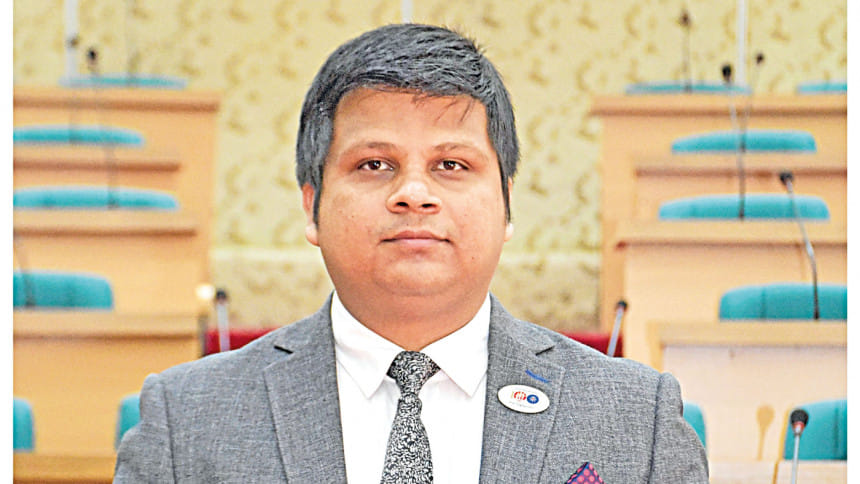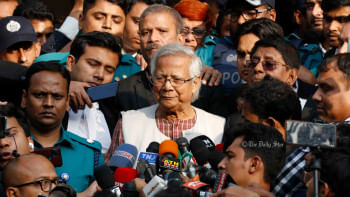Climate negotiations should be grounded in decolonisation and global justice

Mohammad Golam Sarwar, a Chevening & Commonwealth Scholar and an Assistant Professor of Law (on study leave) at the University of Dhaka, is currently pursuing his Doctoral Research on climate crisis and alternative development at SOAS University of London. He is a core member of the IUCN World Commission on Environmental Law Early Career Specialist Group. He has widely published on various aspects of international law, environmental law, climate justice, Constitution, and human rights. As COP28 started in Dubai on 30 November 2023, Parban Chakma and Rafid Azad Saumik talk to him on the following issues:
Law Desk (LD): What discussions do you look forward to in this year COP28?
Mohammad Golam Sarwar (MGS): In my opinion, in the 28th edition of United Nations Climate Change Conference, loss and damage fund will be an important area to deliberate on for financing the developing countries in dealing with climate crisis. Indeed, it is outcome of almost three decades of continuous negotiation between relevant stakeholders and hopefully, modus operandi of the fund will be set in motion through this year's COP. Another important area of discussion is going to be transition from fossil fuel to renewable energy in order to achieve net zero carbon emission. In the context of developing countries such as Bangladesh, these issues have great significance and are worth looking forward to.
LD: How do you view the proposed arrangement of assigning World Bank to administer the loss and damage fund? Do you think that developing countries will be able to avail adequate funding to tackle climate catastrophe?
MGS: The Transitional Committee (TC), after several heated debates, proposed to entrust the World Bank, to operationalise the fund as a World Bank (WB)-hosted Financial Intermediary Fund (FIF) for an interim period of 4 years. The Committee sets out some conditions for World Bank to govern the fund. The conditions include measures to prioritise the autonomy of the Fund's Board over World Bank and an option to dismantle the World Bank arrangement and turn the fund into an independent standalone institution if the Bank fails to comply with the guiding instrument.
Interestingly, the Committee urges the developed country Parties, to continue to provide support, and encourage other Parties to provide, or continue to provide support on a voluntary basis for activities to address loss and damage. This clearly indicates— developed countries have no obligation to financially contribute to this fund— they are merely 'invited' to provide finance for the fund. In my opinion, the recommendations are weak and apparently ineffective in relation to climate justice as there is no clear roadmap for generating financial commitments necessary to operationalise the fund. It is estimated by some researchers that a minimum allocation of 400 billion USD is needed each year for this fund, with the ultimate goal of raising trillions.
Another problem with the World Bank is that it serves the purpose of the western donors led by the US. It is very astonishing that financial institution like World Bank, which has added climate change in their mission very recently, will manage the fund. In different parts of the globe the World Bank financed projects have severely caused ecological damage and accelerated climate induced disasters. Examples are right in front of us— the so-called plantation projects in Bangladesh or forestry program in the Chittagong Hill Tracts (CHT) and other areas, by which the natural forest landscape of the country is changing. Therefore, the loss and damage fund at the hands of World Bank will only become another example of global hegemony and power politics that will facilitate to sustain the dominance of Global North. It remains doubtful whether the fund would meet the financial needs of the vulnerable peoples and communities of the developing countries in the Global South.
LD: As an environmental lawyer from the Global South, do you perceive any influence of climate coloniality in climate negotiations at the COP?
MGS: Carbon inequality should, in fact, be the premise of our deliberations at COP. An Oxfam report of 20 November 2023 says that the richest 1% of the world are responsible for more carbon emissions than the poorest 66%. Moreover, the Global North (in other words, the G8 countries) alone contribute to 92% of excess global carbon emissions. These statistics show how the polluting elites, as the Oxfam report calls them, are single-handedly destroying the mother earth.
On the other hand, when it comes to the impacts, the biggest sufferers are the Global South e.g., Bangladesh. It clearly indicates that deep carbon inequality, which we can also call climate inequality, is getting exceedingly prominent in today's world. Again, this inequality is actually a product of coloniality driven by hyper-consumption, excessive carbon emission, and massive pollution. For the first time in more than three decades since its inception, the Intergovernmental Panel on Climate Change (IPCC) acknowledges colonialism as historical and ongoing driver of the climate crisis.
Moreover, the discussions and suggested policies regarding climate change are also influenced by Western hegemony, and alternate views are not properly incorporated into it. As a result, such discussions fail to get to the core of the problem. These discussions and policies should be based on equity, decolonisation, and justice. Otherwise, this problem of climate change will continue to be COP-washed.
LD: Looking ahead, what should be the core agenda to deal with the impacts of climate change at the COP and beyond?
MGS: Currently, one of the biggest problems relating to climate change is the collective denial of the developed countries. For decades, these countries have persistently denied the gravity of the problem and the solutions thereof. In fact, scholars argue, over the years, International Environmental Law (IEL) has rationalised and legitimised environmental destruction. It has constantly promoted the principle of sustainable development, which some scholars are now terming an 'eco-political project', which is neither developmental nor sustainable.
Scholars like Dipesh Chakrabarty have called climate change a 'wicked' problem, solution to which requires a radical transformation of our economy and political views. We also need to adopt alternative epistemologies and indigenous views in order to tackle this problem, which are much more protective of nature and hold a decolonised perspective against colonial domination.
Moreover, what is needed is a radical transformation of our economy to a model that is less resource-intensive and incorporates renewable and clean energy. During the transition period, the polluting elites must come out of their cocoons of persistent denial and pay compensation and reparation for the disproportionate harms they have caused to the earth over the years. Without adequate assistance from the developed world, achieving an equitable and fast transition will be difficult.
If we want to really solve climate crisis, the polluting elites should be held accountable— they need to make carbon cuts, devote resources to protect the climate and people, and share the burdens of climate crisis not as charity but as compensation for the wrongs done. In addition, the knowledge systems of indigenous communities and the Global South, who are the most affected by climate crisis, should be mainstreamed into these discussions and policies.
LD: How can Bangladesh tackle the impacts of climate change while meeting its developmental needs?
MGS: The impacts of climate change on Bangladesh are quite well-known. To illustrate, Bangladesh has suffered economic losses worth 3.72 billion dollars and witnessed at least 185 extreme weather events from 2000 to 2019. In fact, by the end of the century, Bangladesh is estimated to lose 2-9% of its annual GDP every year. In terms of land, according to the IPCC, Bangladesh will lose 17% of its land by 2050.
Here, I would say Bangladesh is carrying the double burden of tackling the huge impacts of climate change and meeting its huge population's developmental needs. Bangladesh should continue to undertake climate negotiations at the global forums, where the country is already doing a good job. We should continue to do this and develop innovative and strategic methods to present our case better.
Besides, contrary to popular belief, advocating for more funds at the global platforms alone is not sufficient. Bangladesh should strengthen its own local institutions that manage these funds. If our local institutions are filled with corruption and bad governance, any advocacy at the global platforms is bound to fail. We need to develop robust data-driven local loss and damage mechanism to know the exact amount of our loss and damage. With proper data, our case will stand stronger at the global forum. I believe Bangladesh can also assist the world by sharing its own experiences, lessons, and best practices as one of the most climate vulnerable countries.
Lastly, Bangladesh needs to integrate the dimension of climate change into its policymaking. As Bangladesh is heading to graduate from LDC to a middle-income country, we should mainstream climate change dimensions into the development trajectories.
LD: Thank you for your valuable time.
MGS: Thank you for the questions!

 For all latest news, follow The Daily Star's Google News channel.
For all latest news, follow The Daily Star's Google News channel. 




Comments